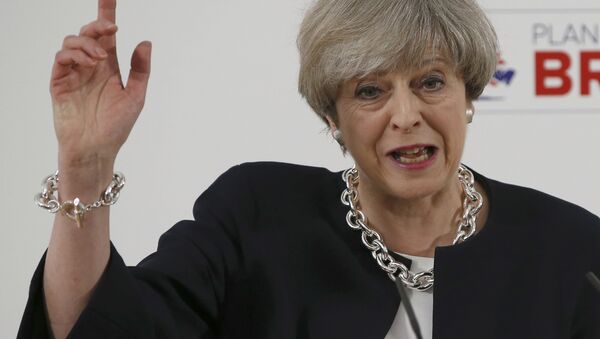May's decision has been questioned by many when she confirmed she would face the Labour party leader Jeremy Corbyn in the House of Commons instead.
"I believe in campaigns where people are out and about. That is what I will be doing," May said.
The House of Commons will vote on April 19 to approve the motion for a snap general election set for June 8.
We need an election now to secure the strong, stable leadership the country needs to see us through Brexit & beyond. https://t.co/8jhvoAcLuR
— Theresa May (@theresa_may) April 18, 2017
May's statement has raised the question as to whether she is up to the job and can withstand the pressure against the opposition parties.
Rather strange that a couple of hours after calling a #GeneralElection, the PM said she is not going to take part in TV debates. #GE2017 pic.twitter.com/4ZLOsTfSKd
— Jeremy Corbyn MP (@jeremycorbyn) April 18, 2017
Sputnik spoke to Professor Paul Whiteley at the University of Essex, who said May's choice is a "big mistake" and she could be missing out on a very important opportunity to show the UK what she has to offer.
"I think she is making a mistake, in 2010 the TV debates were a very important factor in the decision on who to vote for and it was the first time we had them. Then they came again in the 2015 election, and we had them again for the third time, during the referendum last year. So she is refusing to engage with the public, which is not good," Professor Whiteley told Sputnik.
"It seems to be part of a pattern with May as she wanted to exclude the UK parliament from the Brexit negotiations and the Supreme Court ruled that they had to be involved, so there is a pattern of not wanting to engage the public," Professor Whiteley added.
@CarolineLucas @katesang @jeremycorbyn @timfarron @NicolaSturgeon @LeanneWood She'll have a majority that dwarfs all of you put together. Why even bother campaigning when she's going to win handsomely?
— The Word Rabbit (@TheWordRabbit) April 18, 2017
Debate Me If You Can
TV debates are a familiar part of the UK political scene but perhaps not as common and popular as in the US. However according to Professor Whiteley this should not be a concern for Mrs. May.
"I think TV debates are part of the UK political scene: in 2010 we had the first debate and it had a huge audience and it produced a big uptick in support for the Liberal Democrats and their leader at the time Nick Clegg. Clegg was thought to have done a great job against former PM and Tory leader, David Cameron. It was also said that Clegg came out on top against the PM at the time, Gordon Brown. In US, debates started in the 1960s, so it's entrenched in the US but I would say it's entrenched here as well and her [May's] refusal to participate is not good," Professor Whiteley told Sputnik.
Professor Whiteley believes that the performance of party leaders is solely down to the tactics they deploy, stressing that it is of paramount importance the government and the opposition party get the opportunity to defend their positions and that the debates underpin democracy.
If this #GeneralElection is about leadership, as Theresa May said this morning, she should not be dodging head-to-head TV debates.
— Jeremy Corbyn MP (@jeremycorbyn) 18 April 2017
Cold Personality
Could it be that Theresa May is avoiding the debates because she fears the electorate may not like her?
"She resembles Mrs. Thatcher and she is seen as cold and not in touch with ordinary people, in the context of Brexit she has not been seen as warm. But part of her personality is she sees debate as hard and she doesn't like it and I think that is part of the reason for her refusal, which she may have to do a U-turn on. She is afraid of that kind of set-up and to some degree in debates you have to think on your feet. We have seen in US debates that there were occasions when people really lost ground and she has that problem and that is why she is avoiding it," Professor Whiteley told Sputnik.
The SNP @AngusRobertson hammering home TV debates — why won't @Theresa_May debate with @NicolaSturgeon DURING election campaign?
— Darren McCaffrey (@DMcCaffreySKY) 19 April 2017
Good Timing?
Timing is everything when it comes to voting and the PM's unexpected election announcement is something that many feel could work in her favor.
Professor Whiteley believes that this is the right time for the election as Brexit negotiations are turning out to be more complicated, due to the significant opposition to the short bill that triggered negotiations. This early vote will not only benefit the UK government but also the European Union, he told Sputnik.
"There is a general election scheduled for May 2020 and that would coincide with the end of Brexit negotiations and the creation of agreements and doing deals to sort out relationships that have been built over 40 years of membership. So the whole thing would get very messy if the government were to focus on an election at that time," Professor Whiteley told Sputnik.


